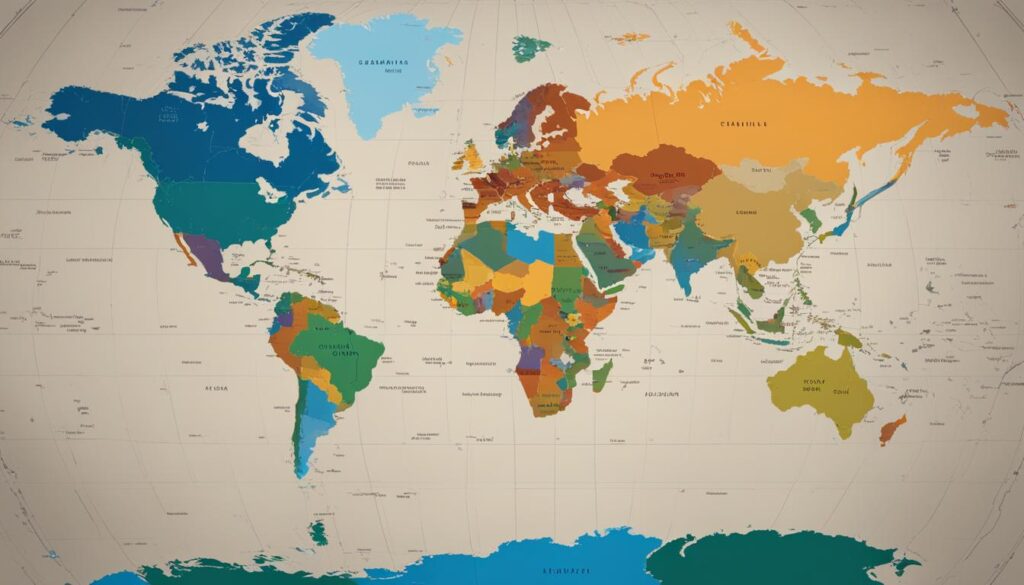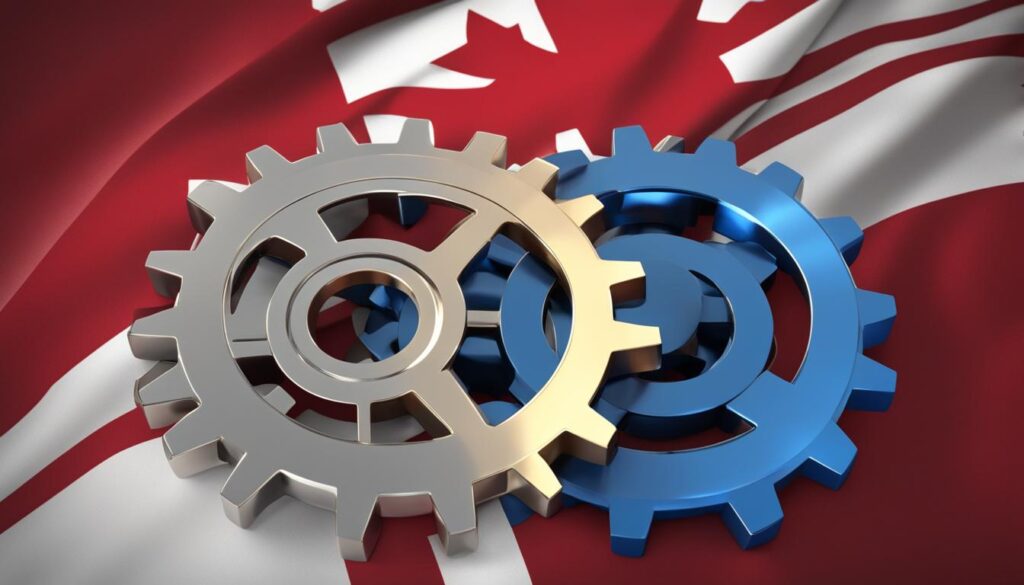Crises and global economic challenges often bring to mind adversity and uncertainty. However, these challenges can also serve as catalysts for positive change and growth. By embracing these challenges head-on, organizations have the potential to uncover valuable economic opportunities and develop innovative solutions to navigate market challenges.
In the face of economic adversity, it’s crucial for businesses to identify financial solutions that can help them overcome hurdles and come out stronger. By analyzing previous crises and studying successful responses, organizations can gain insights into effective strategies for turning challenges into chances.
Key Takeaways:
- Global economic challenges can be transformed into opportunities for growth and positive change.
- Studying previous crises can provide valuable insights for effective problem-solving and innovation.
- Identifying financial solutions is crucial in navigating market challenges.
- Embracing challenges head-on can lead to increased resilience and the emergence of innovative solutions.
- By analyzing previous crises, organizations can position themselves to seize opportunities for growth.
Enhancing Competition and Navigating Regulations in a Globalized Economy
As businesses expand into global markets, they face enhanced competition from existing companies and new entrants. Additionally, navigating complex regulations and legal obligations can pose challenges to conducting cross-border business efficiently. However, a globalized economy also brings opportunities, such as gaining access to new markets and realizing cost savings through economies of scale. By embracing globalization, companies can innovate, acquire talent, and improve their competitiveness in a connected and competitive world.
In a globalized economy, businesses must navigate various obstacles that arise from increased competition and regulations. These challenges may include adapting to different cultural norms and business practices, complying with trade barriers and customs regulations, and understanding and adhering to complex tax legislation in multiple jurisdictions. Companies must invest time and resources in understanding the legal and regulatory landscape of each market they operate in to ensure compliance and mitigate potential risks.
While these challenges may seem daunting, they also present opportunities for businesses to differentiate themselves and gain a competitive edge. By embracing innovation and technology, companies can streamline operations, improve product quality, and enhance customer experiences. Additionally, forming strategic partnerships and alliances with local businesses can help navigate regulatory hurdles and gain a foothold in new markets. By leveraging these opportunities, companies can position themselves for growth and success in a globalized economy.
Enhancing Competition through Innovation
Globalization not only increases competition but also presents opportunities for businesses to innovate and differentiate themselves. By harnessing the power of technology and digital transformation, companies can develop new products and services, improve operational efficiency, and enhance customer engagement. Innovation can help businesses stay ahead of the competition and adapt to rapidly changing market dynamics.
Navigating Regulatory Challenges
Understanding and complying with regulations in a globalized economy can be complex and time-consuming. It is essential for businesses to establish robust compliance programs and work closely with legal and regulatory experts to ensure adherence to local laws and regulations. By proactively addressing regulatory challenges, companies can minimize risks, build trust with stakeholders, and create a solid foundation for sustainable growth.
| Benefits of Embracing Globalization | Challenges of Global Expansion |
|---|---|
|
|
Overall, while businesses face challenges when expanding globally, the rewards are significant. By navigating regulations, embracing innovation, and leveraging opportunities in a globalized economy, businesses can position themselves for success and sustainable growth.
Addressing the Immediate Health Crisis and Climate Change
The COVID-19 crisis has not only posed significant challenges to global health but has also highlighted the urgent need to address climate change. Global economic institutions, such as the G20, WTO, IMF, and World Bank, have a crucial role to play in mitigating these issues and ensuring a sustainable future.
In response to the immediate health crisis, global economic institutions must focus on implementing effective strategies to mitigate the social and economic impact of the pandemic. This includes ensuring equitable access to healthcare, supporting the development and distribution of vaccines, and providing financial assistance to countries in need.
Simultaneously, tackling climate change requires a coordinated and global effort. International institutions can play a critical role in promoting the implementation of the Paris Agreement and providing resources and expertise to support sustainable recovery plans. Additionally, the establishment of climate clubs, linking lending policies to environmental conditionalities, and instituting globally recognized carbon taxes can further incentivize countries to reduce their carbon emissions and transition to clean energy sources.
“The COVID-19 crisis presents an opportunity for global economic institutions to drive meaningful change by addressing the immediate health crisis and climate change.”
In order to achieve these goals, political will and international cooperation are essential. By working together, global economic institutions can pave the way for sustainable and inclusive growth, ensuring a healthier planet for future generations.
| Immediate Health Crisis | Climate Change |
|---|---|
| Ensure equitable access to healthcare | Promote the implementation of the Paris Agreement |
| Support vaccine development and distribution | Provide resources for sustainable recovery plans |
| Offer financial assistance to affected countries | Establish climate clubs |
| Link lending policies to environmental conditionalities | |
| Institute globally recognized carbon taxes |
Tackling Global Inequality and Fostering Long-Term Productivity
Global inequality remains a pressing challenge in today’s interconnected world. As technological advancements continue to reshape industries and economies, it is crucial to address the disparities that arise from these changes. To promote long-term productivity and sustainable growth, global economic institutions must focus on implementing effective policies in areas such as competition and labor markets.
Competition Policies:
Revising competition policies plays a vital role in combating global inequality. By checking the growth of monopolistic structures and promoting fair market competition, countries can create a level playing field for businesses of all sizes. This enables smaller enterprises to thrive, fosters innovation, and facilitates the diffusion of technologies. Additionally, competition policies can ensure that consumers have access to a broader range of products and services at competitive prices.
Labor Market Policies:
Labor market policies also play a significant role in addressing global inequality. By improving worker mobility, countries can create opportunities for individuals to move between different industries and regions, thereby reducing disparities in job opportunities. Implementing comprehensive labor market policies that prioritize skills development, training programs, and fair wages can help bridge the gap between different segments of society and promote inclusive growth.
Furthermore, overhauling social safety nets can provide a safety net for those who are most vulnerable to economic disruptions, ensuring that they have access to basic necessities and opportunities for upward mobility.
| Measures | Impact |
|---|---|
| Revise competition policies | Promote fair market competition and innovation |
| Improve labor market policies | Enhance worker mobility and bridge inequalities |
| Overhaul social safety nets | Provide support for those most vulnerable to economic disruptions |
Implementing these policies is crucial for fostering long-term productivity and reducing global inequality. By creating an environment that promotes fair competition, supports workers’ rights, and provides a social safety net, countries can ensure that the benefits of technological advancements and economic growth are shared by all members of society.

In conclusion, addressing global inequality requires a multi-faceted approach that encompasses competition and labor market policies, along with an overhaul of social safety nets. By implementing these measures, global economic institutions can contribute to a more equitable and productive global economy, promoting sustainable growth and a brighter future for all.
Seizing the Opportunity for Positive Change
The current global economic challenges present an opportunity for global economic institutions and the international community to embrace effective altruism and make the best possible solutions for those worse off. By using the crisis as a chance for improvement, prioritizing the immediate health crisis, climate change, and global inequality, and implementing expert solutions, positive change and growth can be achieved. This requires political will and a commitment to learning from previous crises and challenges. By seizing this opportunity, global economic institutions can lead the way towards a more sustainable, inclusive, and resilient global economy.
“In times of crisis, we have the unique opportunity to reevaluate our priorities and make significant progress towards a better future. Global economic institutions must step up and take decisive action to address the pressing issues at hand. This is not only a responsibility, but also a chance to create lasting positive change that will benefit the most vulnerable populations. We must be driven by effective altruism and prioritize the well-being of all individuals, especially those who are disproportionately affected by the crisis.”
Global economic institutions have a crucial role to play in this transformative process. It is essential to mobilize resources, collaborate with international organizations, and leverage expertise to develop comprehensive strategies that address the immediate health crisis, combat climate change, and tackle global inequality. By aligning their efforts and working towards common goals, these institutions can drive impactful change at a global scale.
However, achieving this vision requires more than just good intentions. It demands strong political will from leaders and decision-makers across the globe. It calls for bold actions, innovative solutions, and a commitment to long-term sustainability. Only by embracing this opportunity for positive change can we create a future where economic growth goes hand in hand with social progress and environmental stewardship.
Table: Priorities for Global Economic Institutions
| Priorities | Actions |
|---|---|
| Immediate Health Crisis | Ensure equitable access to healthcare resources, support vaccine distribution efforts, and strengthen healthcare systems globally. |
| Climate Change | Implement measures to reduce greenhouse gas emissions, promote sustainable development, and support countries in their transition to clean energy sources. |
| Global Inequality | Develop policies that promote inclusive growth, address income disparities, and provide equal opportunities for all individuals. |
The current crisis may seem daunting, but it also presents an unprecedented opportunity for positive change. Global economic institutions must seize this moment, guided by effective altruism and driven by a genuine commitment to creating a better world for future generations. By taking decisive action, prioritizing the most pressing challenges, and fostering international cooperation, these institutions can pave the way towards a more resilient, sustainable, and equitable global economy.

Turning Challenges into Opportunities: A Path to Global Resilience and Growth
Despite the complexity and severity of global economic challenges, there is a path towards resilience and growth. Crises have the potential to be catalysts for positive change, presenting economic opportunities that can shape a more prosperous future. By studying and analyzing previous crises, businesses, organizations, and nations can learn valuable lessons and adopt effective solutions to navigate challenges successfully.
To seize these economic opportunities, a proactive approach is crucial. This requires political will and international cooperation to address the immediate health crisis, climate change, and global inequality. By prioritizing these key areas, global economic institutions can play a pivotal role in shaping a sustainable and inclusive global economy.
Building global resilience and growth requires a collective effort. By recognizing the potential opportunities within crises, embracing effective solutions, and fostering international collaboration, we can overcome challenges and emerge stronger. It is through these proactive measures that we can create a more resilient and prosperous world, even in the face of adversity.
FAQ
How can crises present opportunities for growth and positive change?
Crises have historically led to rapid problem solving, innovation, increased resiliency, cooperation among rivals, systemic change, and the emergence of talent.
What are the challenges businesses face when expanding into global markets?
Businesses face enhanced competition from existing companies and new entrants, as well as navigating complex regulations and legal obligations.
What opportunities does globalization bring to companies?
Globalization offers opportunities such as gaining access to new markets and realizing cost savings through economies of scale, as well as the ability to innovate and acquire talent in a connected and competitive world.
How can global economic institutions address the challenges presented by the COVID-19 crisis?
Global economic institutions can take immediate actions to mitigate the social and economic impact of the pandemic, implement sustainable recovery plans, and ensure fair distribution of the COVID-19 vaccine.
What measures can be taken to address global inequality?
Measures include revising competition policies, promoting technology diffusion, correcting biases in the tax system, improving digital infrastructure and literacy, and overhauling social safety nets.
How can global economic institutions contribute to positive change?
Global economic institutions can prioritize the immediate health crisis, climate change, and global inequality, and implement expert solutions to achieve sustainable and inclusive growth.
Is there a path towards resilience and growth in the face of global economic challenges?
Yes, by recognizing opportunities, studying previous crises, embracing effective solutions, and promoting a proactive approach, businesses, organizations, and nations can navigate challenges and build a stronger future.
How Can Global Economic Challenges Be Navigated to Achieve Financial Rewards?
Navigating global financial risks requires a strategic approach to overcome the challenges and reap financial rewards. Assessing economic trends, diversifying investments, and staying informed about market fluctuations are vital. Effective risk management, adapting to emerging markets, and fostering international collaborations can help mitigate potential pitfalls and maximize financial gains in the global economy.
Source Links
- https://www.brookings.edu/articles/sometimes-the-world-needs-a-crisis-turning-challenges-into-opportunities/
- https://www.linkedin.com/pulse/challenges-opportunities-doing-business-globalized-economy-
- http://www.inquiriesjournal.com/articles/1906/turning-crisis-into-opportunity-how-global-economic-institutions-can-use-covid-19-as-a-to-address-global-challenges


Pingback: Equalize Your Earnings: Striving for Global Economic Equality! – Straight Fire Money